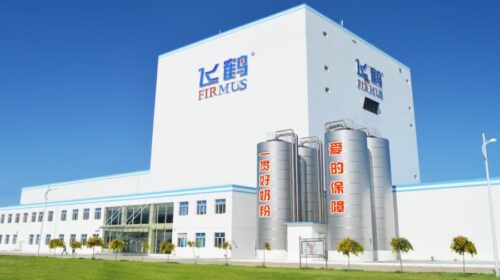Singapore business dynasty has Vitasoy in its sights

The Hong Kong beverage brand has been recovering from a sales slump in mainland China, but its founding family could now face a takeover challenge
Key Takeaways:
- Vitasoy’s profits rose 5% in the first half of the year to HK$170 million while operating profit on the Chinese mainland jumped 15%
- The company’s share price has more than doubled in two months as Singapore’s Ng family increased its stake, fueling talk of a takeover bid
By Lee Shih Ta
Three years after surviving an existential crisis, Hong Kong drinks maker Vitasoy International Holdings Ltd. (0345.HK) could be facing another pivotal moment in its corporate history.
The soymilk producer became embroiled in a politically charged scandal in 2021 after one of its workers stabbed a Hong Kong policeman. An ensuing storm on Chinese social media led to a consumer boycott that took a heavy toll on sales and battered the firm’s share price.
In its wounded state, Vitasoy has now become the potential target of a hostile takeover by a business empire controlled by Singapore’s powerful Ng family.
It could turn out to be the battle of the Asian beverage brands.
In early October, chrysanthemum tea company Yeo Hiap Seng began to accumulate Vitasoy shares. The company is backed by a business dynasty with property holdings in Singapore and Hong Kong, headed by Sino Land (0083.HK) chairman Ng Chee Siong, who has topped Singapore’s rich list. His younger brother, Ng Chee Tat, has been buying up Vitasoy shares through the Singaporean tea company and his family office, rapidly taking his stake from 5% to 12.26%.
The buying spree has triggered market speculation about a takeover, sending the Vitasoy stock rocketing from HK$4.52 ($0.58) in late September to just over HK$12 by the end of November. The company’s market value also soared to well over HK$13.2 billion.
Vitasoy’s chairman, Lo Yau Lai, was pressed for comment at a results conference but said he had no knowledge of the motives behind the stock purchase. Any questions should be directed at the buyer of the shares, he said.
Asked whether he would buy a bigger block of Vitasoy shares as a defensive maneuver, Lo said any actions would be reported to the Hong Kong Stock Exchange and made public “when the time is right”.
Main battleground
Vitasoy was founded in 1940 by the current chairman’s father, Lo Kwee Seong, offering beverages such as soy milk, lemon tea, fruit juice and bottled water. In 1994 the company went public in Hong Kong and established a factory in Shenzhen as a springboard for expansion into the mainland market. A scandal over adulterated baby formula in 2008 dealt a severe blow to China’s dairy industry and turbocharged demand for plant-based drinks. Vitasoy’s annual compound growth rate in mainland China reached 26% between 2008 and 2019, as sales there surpassed the Hong Kong level in 2016.
The company’s performance peaked in 2019 when revenues hit a record HK$7.53 billion, with 61% of the total coming from mainland China.
However, two years later the company landed in hot water over an attack carried out by one of its workers on the anniversary of Hong Kong’s return to Chinese rule. The employee stabbed a Hong Kong policeman, who survived the assault, and then killed himself. When an internal memo expressing condolences for the attacker’s family came to light, Vitasoy faced an intense online backlash in China. Although the company insisted it had not authorized the memo, Vitasoy products were pulled from Chinese stores and sales plunged. Mainland Chinese revenue tumbled 23% in fiscal 2022, pushing Vitasoy to its first annual loss as a listed company, when it landed HK$159 million in the red.
A cost-cutting drive helped push Vitasoy back into the black the following year, but revenues kept falling. In the year to March 2024 the company’s turnover was down to just HK$6.22 billion.
Vitasoy has shifted its strategy to offset a slowdown in the plant-based beverage market in mainland China, focusing on lemon tea and sugar-free drinks to rebuild its market share. Targeting health conscious consumers, the new range includes sugar-free lemon and jasmine teas, as well as products that are designed to be steeped in cold water.
The latest earnings show the efforts are bearing fruit. Revenues for the first half of 2024 rose 2% to HK$3.44 billion from the same period a year earlier, while profits increased 5% to HK$170 million, as pressures on mainland sales eased. Lower prices for raw materials and strict cost controls helped operating profit from the Chinese mainland increase 15% to HK$220 million.
Blending tea and milk brands
Although its business has picked up, a weak share price left the company vulnerable. The stock peaked at HK$42.6 in June 2019 but lost 90% of its value to trade at HK$4.47 in September this year, before the recent rally took off.
The price drop may have put a target on Vitasoy’s back. Singapore’s Ng family now controls around 17.36% of Vitasoy stock, with Ng Chee Tat and related entities holding 12.26% and his elder brother Ng Chee Siong owning 5.10%.
The Lo family still has a bigger stake than the Singaporean dynasty, controlling over 25% of the shares through Lo Yau Lai and related interests.
The company’s fate may lie in the hands of other major shareholders, including
Mitsubishi UFJ Financial Group with a 6.8% stake and the Canadian fund Global Alpha Capital Management with 5.1%. The Japanese bank has been selling shares to the Ng family and if the Canadian fund follows suit, the Lo family’s dominance could be in jeopardy.
Founded in 1900, Yeo Hiap Seng has a longer history in the beverage business than Vitasoy, focusing on Southeast Asia. In recent years it has been looking to go beyond its mainstay products such as chrysanthemum tea, water chestnut drinks and soy milk, developing a bigger range of teas. Vitasoy could serve as an effective launch pad for its mainland ambitions.
The Ng family could still make a profit on the shares, even if an acquisition fails to materialize. But it could be a different story for other investors. The takeover fever has pushed Vitasoy’s price-to-earnings (P/E) ratio to 95 times, way above the 25.4 times for global drinks giant Coca-Cola (KO.US). If the Singaporean buying spree peters out, the share price could go into a tailspin. Investors who have been chasing the stock on its upswing should weigh up the downside risks.
To subscribe to Bamboo Works weekly free newsletter, click here






